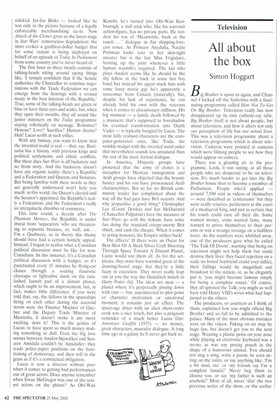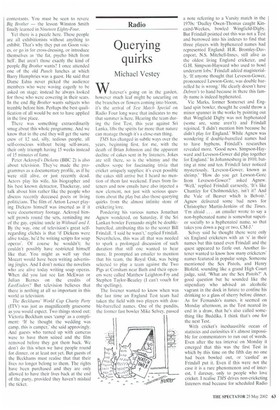All about the box
Simon Hoggart
Big Brother is upon us again, and Channel 4 kicked off the festivities with a fascinating programme called How Not To Get On Big Brother. Television really has now disappeared up its own cathode-ray tube. Big Brother itself is not about people, but about television, and how it alters not only our perception of life but our actual lives. This was a television programme about a television programme which is about television. Cameras were pointed at cameras which were filming people to see how they would appear on camera.
There was a gloating air to the programme. Look, it was saying, at all these people who are desperate to be on television. It's much harder to get into the Big Brother house than to become a member of Parliament. People who'd applied — around 7.500 sent in videos of themselves — were described as 'contestants' but they were really votaries, petitioners at the court of a mediaeval king, and just as certain that his touch could cure all their ills. Some wanted money, some wanted fame, many wanted to prove themselves to their parents or win a strange revenge on a faithless lover. As the numbers were whittled away, one of the producers gave what he called 'The Talk Of Doom', warning that being on television might not help them but could destroy their lives: they faced rejection on a scale no bored boyfriend could ever inflict, their failings would be magnified and broadcast to the nation, or, as he elegantly put it, 'you might become famous simply for being a complete tosser.' Of course, they all ignored the Talk; you might as well have told Henry VIII's wives what had happened to the others.
The producers, or courtiers as I think of them, explained how you might offend Big Brother and so fail to be admitted to the palace. Many of the most obvious mistakes were on the videos. Puking on air may be huge fun, but doesn't get you to the next stage. Wearing a plastic penis on your nose while playing an electronic keyboard was a no-no, as was any posing pouch in the shape of a humorous animal. You should not sing a song, write a poem, be seen sitting on the toilet, or say anything like: 'I'm a bit mad, me' or 'my friends say I'm a complete lunatic!' Never beg them to choose you, or say 'my father is such an arsehole!' Most of all, never `diss' the two previous series of the show, or the earlier contestants. You must be seen to revere Big Brother — the lesson Winston Smith finally learned in Nineteen Eighty-Four.
Yet there is a puzzle here. These people are all exhibitionists without anything to exhibit. That's why they put on Goon voices, or go in for cross-dressing, or introduce themselves as 'the fat, psycho bitch from hell'. But aren't those exactly the kind of people Big Brother wants? I once attended one of the old Punch lunches at which Barry Humphries was a guest. He said that Dame Edna never picked the audience members who were waving eagerly to be asked on stage; instead he always looked for those who were cowering in their seats. In the end Big Brother wants subjects who tremble before him. Perhaps the best qualification of all would be not to have applied in the first place.
There was something extraordinarily smug about this whole programme. And we know that in the end they will get the same crew of 12 sad, silly, tedious people, all self-conscious without being self-aware, their only triumph having 15 weeks instead of 15 minutes of fame.
Peter Ackroyd's Dickens (BBC 2) is also about television. They've made the pro grammes as a documentary profile, as if he were still alive, or just recently dead. Actors play his wife, his biographer and his best known detractor, Thackeray, and talk about him rather like the people who discuss recently deceased poets or living politicians. The film of Anton Lesser play ing Dickens himself was inserted as if it were documentary footage. Ackroyd him self prowls round the sets, reminding me of the gay, epicine uncle in Withnail and I. By the way, one of television's great self regarding clichés is that 'if Dickens were alive today, he'd be writing scripts for soap operas'. Of course he wouldn't; he couldn't possibly have restricted himself like that. You might as well say that Mozart would have been writing advertis
ing jingles. And I don't notice the novelists
who are alive today writing soap operas. When did you last see Ian McEwan or Julian Barnes on the credits of EastEnders? But television believes that there is nothing at all so important in this world as television.
The Beckhams' World Cup Charity Parry (ITV) was just as magnificently gruesome as you would expect. Two things stood out: Victoria Beckham uses 'camp' as a compliment: 'If he thought the wedding was camp, this is camper,' she said approvingly.
And guests who turned up with cameras were to have them seized and the film removed before they got them back. We don't do this when we have people round for dinner, or at least not yet. But guests of the Beckhams must realise that that their lives no longer belong to them. The rights have been purchased and they are only allowed to have their lives back at the end of the party, provided they haven't mislaid the ticket.























































































 Previous page
Previous page